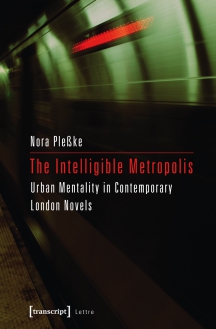See also: RESOURCES / TRANSLATIONS
 |
Conversations with Ian McEwanRyan Roberts, editor. Conversations with Ian McEwan collects sixteen interviews, conducted over three decades, with the author (b. 1948) of such highly praised novels as Enduring Love, Atonement, Saturday, and On Chesil Beach. McEwan discusses his views on authorship, the writing process, and the major themes found in his fiction, but he also expands upon his interests in music, film, global politics, the sciences, and the state of literature in contemporary society. McEwan's candid and forthcoming discussions with some of the greatest minds of his time - Martin Amis, Christopher Ricks, Zadie Smith, Ian Hamilton, Antony Gormley, David Remnick, and Steven Pinker - provide readers the most in-depth portrait available of the author and his works. Readers will find McEwan to be just as engaging, humorous, and intelligent as his writings suggest. The volume includes interviews from British, Spanish, French, and American sources, two interviews previously available only in audio format, and a new interview conducted with the book's editor. |
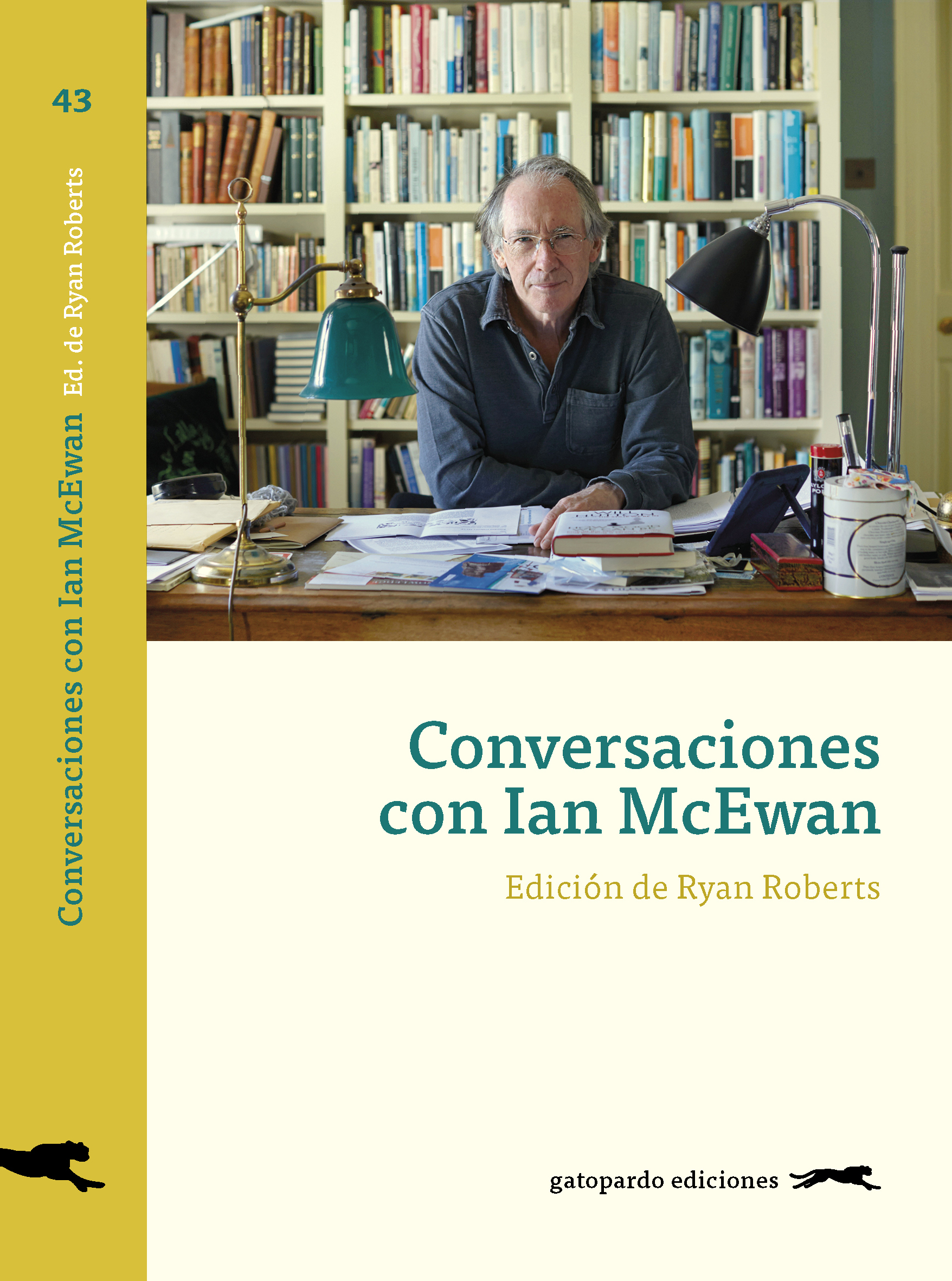 |
Conversaciones con Ian McEwanRyan Roberts, editor. Conversaciones con Ian McEwan reúne catorce entrevistas que abarcan cuarenta años de la trayectoria del autor de Expiación, Sábado y Chesil Beach. En diálogo con prestigiosos escritores como Martin Amis, Zadie Smith y David Remnick, y el psicólogo Steven Pinker, entre otros, McEwan desgrana su visión del proceso creativo y sus obsesiones narrativas con la agudeza, el humor y la inteligencia que le caracterizan como prosista. Desde la fijación por las pulsaciones humanas más oscuras que acota el universo de sus primeros relatos hasta su exploración, en obras posteriores, del cruce entre historia colectiva e individual, o de los mecanismos y las trampas de la conciencia, McEwan ha hurgado siempre en las zonas de sombra que sólo el bisturí de la ficción es capaz de iluminar. Sin embargo, McEwan es un escritor que nutre y cuestiona su literatura a la luz de otras disciplinas y lenguajes. En estas conversaciones, se explaya sobre temas como las implicaciones de la neurociencia y la biología evolutiva para la práctica de la literatura, las paradojas de la Guerra Fría, los malentendidos que gobiernan las relaciones entre hombres y mujeres, o sus reservas respecto al realismo mágico. «Si tienes un día bueno, la escritura se presenta como pura libertad mental, como uno de los mayores placeres individuales de la vida, junto al sexo, el esquí y el montañismo.» -- Ian McEwan |
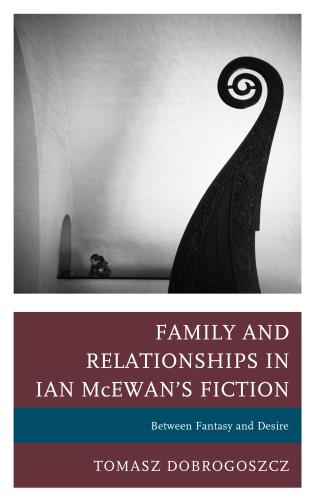 |
Family and Relationships in Ian McEwan's Fiction: Between Fantasy and DesireTomasz Dobrogoszcz From the Publisher: The book provides a lucid analysis of all Ian McEwan fiction published to date, from his 1975 debut short stories up to the 2016 novel Nutshell, spanning forty years of his literary career. Apart from a general discussion of McEwan’s works, the study offers a uniform focal point: it concentrates on one of the key issues taken up by the writer – the aspect of relationships between partners and between family members. |
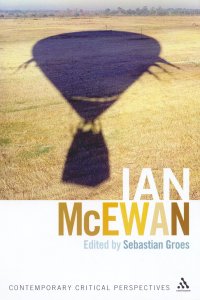 |
Ian McEwan: Contemporary Critical PerspectivesEdited by Sebastian Groes A valuable addition to McEwan scholarship, this collection of essays from the Contemporary Critical Perspectives series helps define and guide the future course of McEwan studies. Preface: Ian McEwan and the Rational Mind, Matt Ridley Includes a chronology, bibliography of further readings, and an index. |
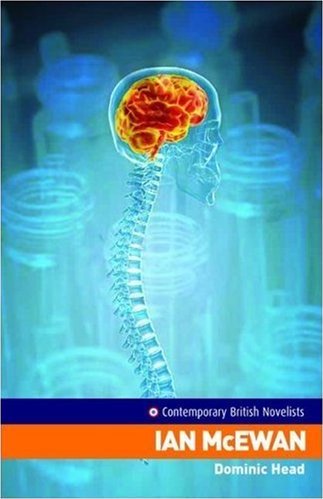 |
Ian McEwan (Contemporary British Novelists)Dominic Head In this survey Ian McEwan emerges as one of those rare writers whose works have received both popular and critical acclaim. His novels grace the bestseller lists, and he is well regarded by critics, both as a stylist and as a serious thinker about the function and capacities of narrative fiction. McEwan’s novels treat issues that are central to our times: politics, and the promotion of vested interests; male violence and the problem of gender relations; science and the limits of rationality; nature and ecology; love and innocence; and the quest for an ethical worldview. Yet he is also an economical stylist: McEwan’s readers are called upon to attend, not just to the grand themes, but also to the precision of his spare writing. Although McEwan’s later works are more overtly political, more humane, and more ostentatiously literary than the early work, Dominic Head uncovers the continuity as well as the sense of evolution through the oeuvre. Head makes the case for McEwan’s prominence – pre-eminence, even – in the canon of contemporary British novelists. |
 |
Understanding Ian McEwanDavid Malcolm One of the most comprehensive books of scholarship on Ian McEwan's writing, Malcolm covers McEwan's earliest short stories through Amsterdam. Chapters include:
1. Understanding Ian McEwan Includes a brief bibliography of additional criticism. A must for anyone studying McEwan's early work and highly recommended for general readers interested in acquiring a deeper understanding of the author. |
 |
The Fiction of Ian McEwan (Readers' Guides to Essential Criticism)Peter Childs This book introduces students to a range of critical approaches to McEwan's fiction. Criticism is drawn from selections in academic essays and articles, and reviews in newspapers, journals, magazines and websites, with editorial comment providing context, drawing attention to key points and identifying differences in critical perspectives. Also includes selections from published interviews with Ian McEwan. |
 |
Ian McEwan (Twayne's English Authors Series)Jack Slay, Jr. One of the standard works on Ian McEwan. The nine chapters are as follows:
1. Meeting Ian McEwan The book also includes a selective bibliography and an author chronology through 1994. |
 |
Ian McEwan (New British Fiction)Lynn Wells Contents: Timeline 'A very intelligent and knowledgeable, but also highly accessible book, containing some of the best succinct readings of McEwan's fiction to date.' -- Professor Peter Childs, University of Gloucestershire |
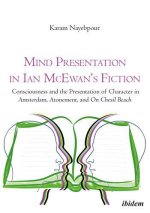 |
Mind Presentation in Ian McEwan's FictionKaram Nayebpour From the Publisher: This book explores the central fictional minds in three of Ian McEwan's most popular narratives. Mind presentation constitutes the main part of characterization in the second phase of McEwan's writing, where his plot structure depends to a large degree on the presentation of the characters' mental workings. In Amsterdam (1998), Atonement (2003), and On Chesil Beach (2007), the construction process of the fictional minds, the degree their functioning is impacted by their experiences, and the way their mental aspect controls their behavior and relationships are critical to the stories. Relying on insights and methods from cognitive narratology, this study follows two purposes: It firstly analyzes the function of fictional minds and their operational modes in these narratives. Secondly, it explores the impact of the characters' experiences on both their mental functioning and their behavior, especially with view of their relationships. Nayebpour reveals that the plot structure of these narratives highly depends on the lack of a sound balance between the two aspects of the represented minds (intermental/joint thought and intramental/individual thought) as well as on the dominance of the intramental one. The tragic atmosphere in these narratives, Nayebpour argues, is the result of this imbalance. |
 |
Writers in Conversation with Christopher Bigsby: Volume 5Unthank Books, September 2013 Volume 5 in the Writers in Conversation series featuring interviews with writers taken at the Arthur Miller Centre's International Literary Festival at the University of East Anglia over the past decade. Volume 5 contains an interview with Ian McEwan from November 2012, in which he discusses Christopher Hitchins, the secret services, his childhood, and UEA, amongst other things. |
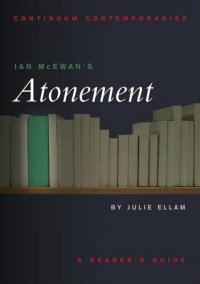 |
Ian McEwan's Atonement (Continuum Contemporaries)Julie Ellam A good introduction to the major themes of one of McEwan's most highly regarded novels. 1. The Novelist |
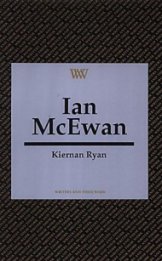 |
Ian McEwan (Writers and Their Work)Kiernan Ryan A slim volume, but an excellent introduction to Ian McEwan's early works. The ten chapters cover:
1. Introduction: The Art of Unease The book also includes a selective bibliography. |
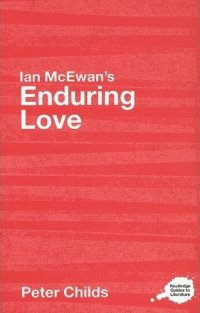 |
Ian McEwan's Enduring Love (Routledge Guides to Literature)Peter Childs Well-known McEwan scholar Peter Childs explores the intricacies of one of McEwan's finest novels. The book contains the following:
1. an accessible introduction to the text and contexts of Enduring Love Part of the Routledge Guides to Literature series, this volume is essential reading for all those beginning detailed study of Enduring Love. Recommended for teachers, students, and reading groups interested in studying McEwan's novels. |
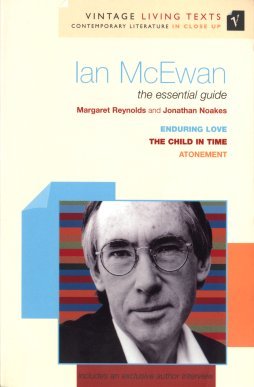 |
Ian McEwan: The Essential GuideMargaret Reynolds & Jonathan Noakes In Ian McEwan: The Essential Guide, Reynolds and Noakes deal with the themes, genre, and narrative techniques employed by Ian McEwan in The Child in Time, Enduring Love, and Atonement. It also includes an interview with McEwan, detailed reading plans, questions for essays and discussion, contextual materials, suggested texts for complementary and comparative reading, a picture essay, extracts from reviews, a biography, and selected extracts from reviews. Recommended for teachers, students, and reading groups interested in studying McEwan's novels. |
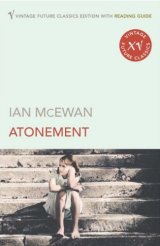 |
Ian McEwan: Atonement (Reading Guide Edition)Vintage, 2005. This edition of Ian McEwan's classic novel Atonement includes the full text of the novel along with a helpful Reading Guide. |
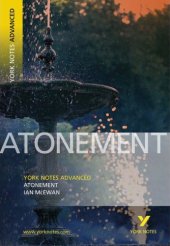 |
York Notes on AtonementAnne Rooney A great resource for anyone studying McEwan's Atonement, whether for personal enjoyment, a book club, class, or for the A Level exams. (NOTE: York Notes are intended as a supplement to Atonement, not as a substitute for a close reading of the text.) Far more than a simple synopsis guide, York Notes provides a rich introduction to Atonement, its major characters, style, structure, overarching themes, and narrative techniques. Each of these critical approaches are dealt with in detail by Anne Rooney, a former English instructor at the Universities of Cambridge and York and the author of over eighty books, including GCSE and A Level guides. The glossary and countless sidebar notes are especially helpful for the beginning literature student. Also included are 2-3 page "extended commentaries" on select passages from the novel that highlight McEwan's development of characters, themes, etc. Contents are as follows: Note on the text and synopsis |
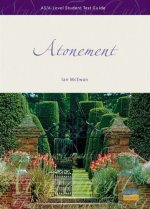 |
AS/A-Level English Literature: AtonementRobert Swan, editor Student Text Guides are writtten by teachers and examiners for the specific needs of students of AS/A-level English Literature, whether attempting a coursework assignment or revising for an examination. They should be used as an accompaniment to the novel, not as a substitute. |
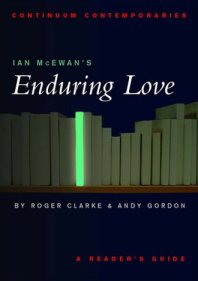 |
Ian McEwan's Enduring Love: A Reader's GuideRoger Clarke & Andy Gordon A wonderful book devoted to exploring the intricacies of McEwan's Enduring Love. Includes a lengthy biographical chapter and reading/discussion questions. Chapters are as follows: The Novelist A must for anyone teaching or studying this novel. Great for reading groups, as well, given its low price. |
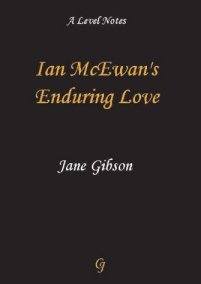 |
A Level Notes for Ian McEwan's Enduring LoveJane Gibson Intended to assist students in their preparation for the A-Level examination. Includes three sample essays based on the work produced by the author's A-Level classes. |
 |
Coming to Terms with Crisis: Disorientation and Reorientation in the Novels of Ian McEwanSwantje Möller From the Publisher: The study offers a critical reading of Ian McEwan's novels by placing them in the discourse on postmodernity and ethics. Starting from the assumption that as human beings we have a fundamental need for ethical orientation which is of particular importance in a postmodern world characterised by contingency and change, the study investigates how the themes of crisis and reorientation are negotiated in McEwan's novels. Acknowledging the central role of alterity in these novels, the study draws its theoretical framework largely from ethicists in the Levinasian tradition who, rather than arguing for normative codes of behaviour or notions of virtue, understand ethics in terms of the interactive encounters between individuals. The study therefore aims to contribute not only to the growing body of scholarship on Ian McEwan and, to a certain extent, to reorient our understanding of his writing, but also to take part in the ongoing debate about the relationship between literature and ethics. |
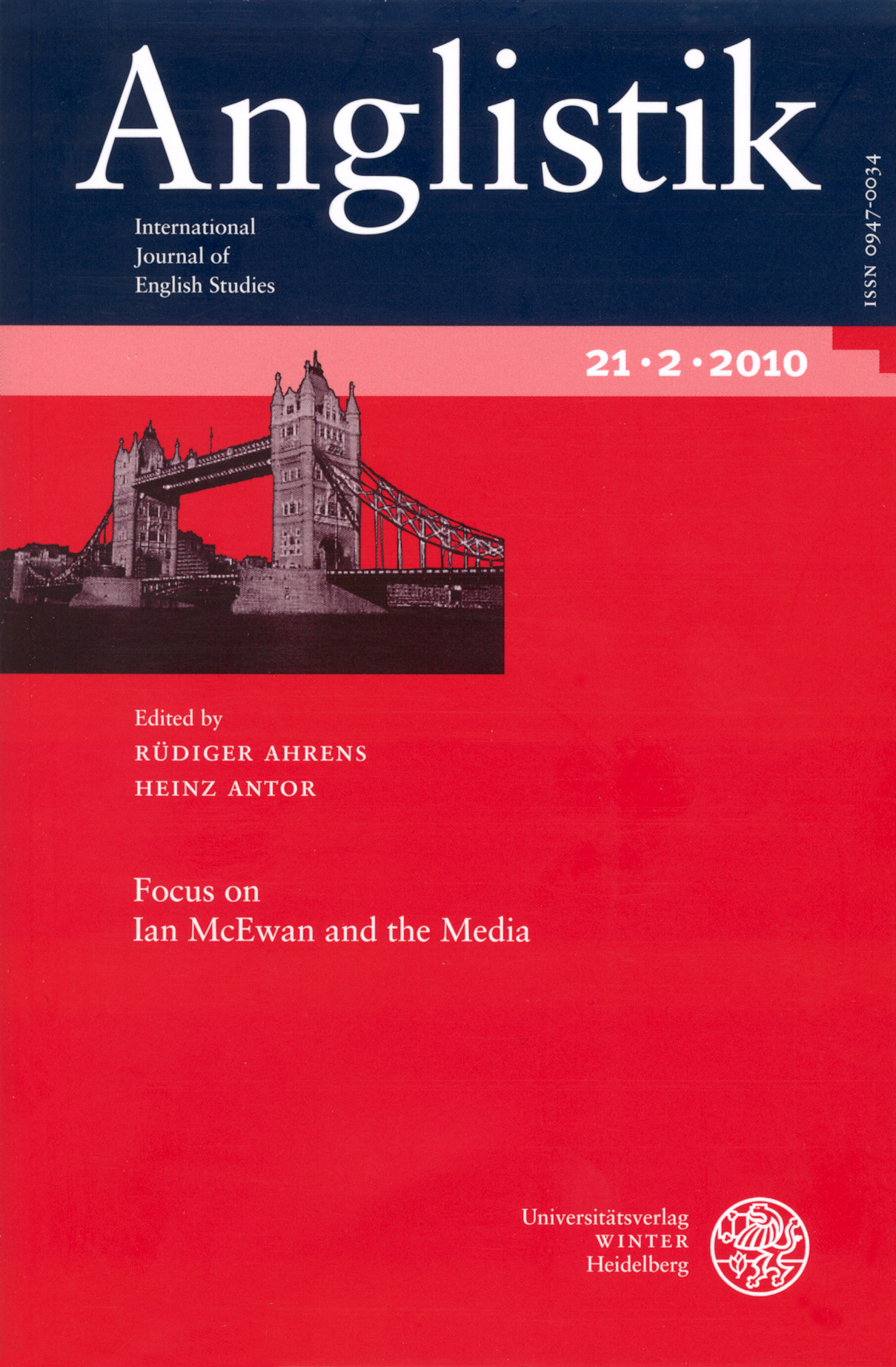 |
Anglistik (with a focus on Ian McEwan and the Media)Eds. Rüdiger Ahrens and Heinz Antor Special Focus Contents: Pascal Nicklas: Ian McEwan and the Media (p. 7) |
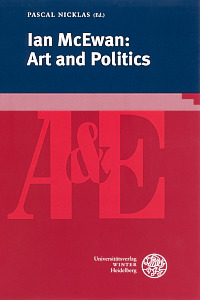 |
Ian McEwan: Art and PoliticsPascal Nicklas From the Publisher: Ian McEwan's work is paradigmatic for the intricate relationship between art and politics in British fiction. Whereas his early work is more concerned with the family and its perversions, there is a definite politicization after The Comfort of Strangers (1981). The years between McEwan's Venetian novel and The Child in Time (1987) was a period of gestation: he wrote the libretto Or Shall We Die? (1983) and the script for The Ploughman's Lunch (1985) taking up nuclear disarmament and Thatcherism. McEwan saw these works as A Move Abroad (1989) and returned to the novel with the caustically political The Child in Time. All his later novels have strong political undertones most drastically visualized in The Innocent (1990): Otto's mutilated corpse as an image of Berlin. In Saturday (2005), the mass rally against the Iraq War in 2003 is the background against which the Perowne's Bloomsday takes place. Similarly, in Black Dogs (1992) or Amsterdam (1998) politics are shown in their complex relationship to art which is also celebrated in Atonement (2001). |
 |
Ijan Makjuan: polifonija zlaGeopoetika, 2009. From the Publisher: Ian McEwan has demonstrated a remarkable interest in the problem of evil from the very beginning of his writing career. yet, he is not focused on the anthropology of evil but is primarily attracted to the epistemology of evil and the presentation how this encounter is reflected upon the lives of his protagonists. The structure of McEwan's novels is based on the process of initiation which his naive and inexperienced characters have to undergo. This initiation brings them the newly acquired maturity. As the nine analyzed novels (The Cement Garden, The Comfort of Strangers, The Child in Time, The Innocent, Black Dogs, The Daydreamer, Enduring Love, Amsterdam, and Atonement) show, love proves to be the only force which can bring atonement and rebirth. Language: Serbian |
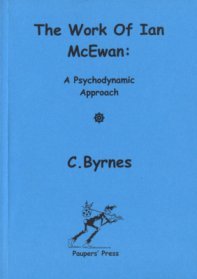 |
The Work of Ian McEwan: A Psychodynamic ApproachC. Byrnes This thesis traces the 'metaplot' of Ian McEwan's progress, through his professional writing. Early in his career, he gained access to elements of his unconscious through free-association, active imagination, meditation and the use of recreational drugs. These elements, which surfaced gradually and piecemeal, include strong feelings associated with the Oedipus complex, difficulties with masculine self-identification, feelings of rejection, unresolved grief, wishes to regress to the latency period of childhood, and sexuality contaminated with anal-sadistic power issues. McEwan dealt with these themes by creating characters who expressed them through sexual deviations and violence or acted them through to their logical conclusion. Thus he was able to confront previously repressed aspects of his inner life and resolve some of his emotional problems in safety, while availing himself of rich material for his fiction. The psychodynamic interpretations offered in this thesis depend on a detailed study of McEwan's published work. Their aim is to isolate the separate threads in the fabric of his fiction and demonstrate the maturation and increasing sophistication of his work. |
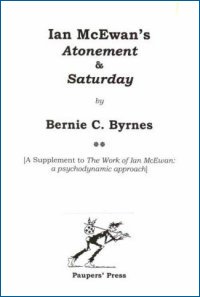 |
Ian McEwan's Atonement & SaturdayBernie C. Byrnes This book supplements Byrnes's previous book on Ian McEwan: The Work of Ian McEwan: A Psychodynamic Approach. Explores McEwan's Atonement and Saturday, two novels not included in the previous study. |
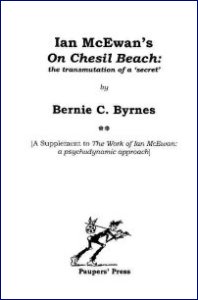 |
Ian McEwan's On Chesil Beach: The Transmutation of a 'Secret'Bernie C. Byrnes In 2002 The Work Of Ian McEwan: A Psychodynamic Approach was published by Paupers’ Press. In it Bernie C. Byrnes traced the ‘metaplot’ of Ian McEwan’s fiction and offered psychodynamic interpretations of his published work, culminating in the Booker prize winning Amsterdam (1998). Subsequently McEwan published two more books: Atonement (2001) and Saturday (2005). Bernie C. Byrnes responded with a supple-ment to that main work which deals with those later novels in detail. This volume, a further supplement, assesses McEwan’s novel On Chesil Beach. |
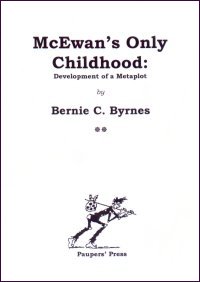 |
McEwan's Only Childhood: Development of a MetaplotBernie C. Byrnes The revelation of David Sharp's existence has made it possible for Byrnes to review her previous hypotheses about the metaplot. The earlier explanations still hold good, based as they are on information from a careful study of his work, but the appearance of David adds a new dimension to his 'unfolding story'. Bernie C. Byrnes argues here that David Sharp's secret existence has had a profound influence on McEwan's creativity from the beginning and traces its effect through his fiction, up to and including his most recent publication On Chesil Beach (2007). |
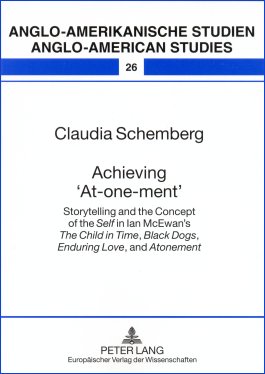 |
Achieving 'At-one-ment': Storytelling and the Concept of the Self in Ian McEwan's The Child in Time, Black Dogs, Enduring Love, and AtonementClaudia Schemberg An interesting study, Achieving 'At-one-ment' analyses the many ways McEwan's characters and narrators 'structure their worlds, endow it with meaning, and strive for "at-one-ment" in their lives'. Chapters include: The Storied Self in Moral Space Claudia Schemberg studied English and French at the Universities of Kln and Southampton (1997-2004) and, at the time of publication, is writing her Ph.D. thesis. She works as a lectrice at New Hall, Cambridge (UK). |
La Nuova Letteratura Inglese Ian McEwanGaetano D'Eliva and Christopher Williams |
Perversions Textuelles dans la Fiction d'Ian McEwanContact the Publisher: Editions l'Harmattan |
 |
Ian McEwan's The Cement Garden and the Tradition of the Child/Adolescent as 'I-Narrator'Dr. Christopher Williams This pamphlet is made available in full text courtesy of Dr. Christopher Williams. |
